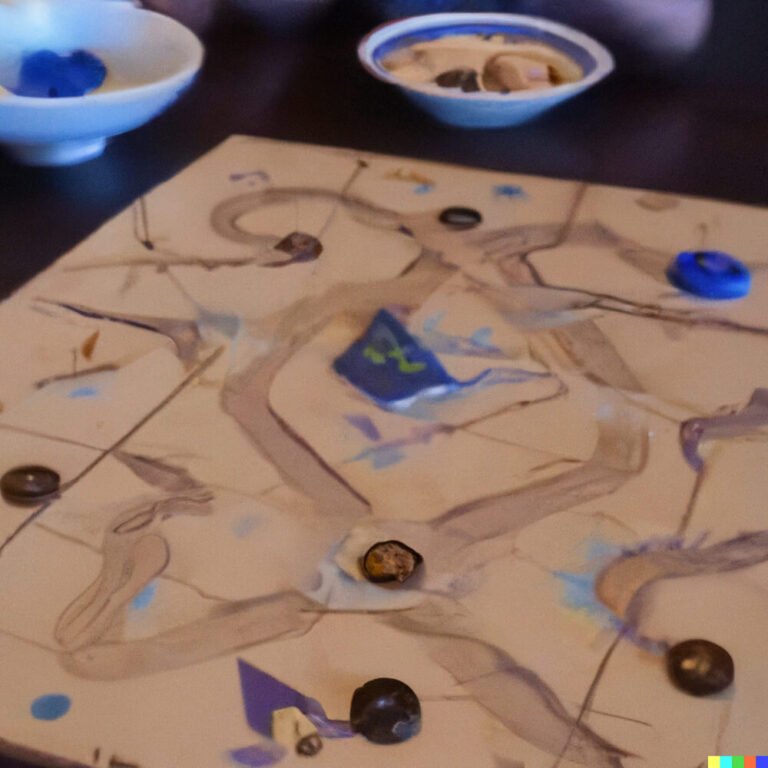Board games have always held a special place in the hearts of people, serving as a source of joy, laughter, and friendly competition. Whether played on rainy days at home with family or during social gatherings with friends, classic board games have an enduring appeal that transcends generations. They bring people together, ignite strategical thinking, and create unforgettable memories. In this article, we will delve into the captivating world of top classic board games and explore their timeless charm.
The popularity of classic board games can be attributed to their ability to transport players to a different era or realm. These games evoke a sense of nostalgia and fondness for simpler times. From the ancient game of Chess to more contemporary favorites like Monopoly and Scrabble, these classics hold a special place in our collective memory. They have stood the test of time and continued to captivate players young and old.
One of the most remarkable aspects of classic board games is their universal appeal. These games transcend borders and cultures, providing a common language through which people from all walks of life can connect.
The simple act of sitting around a table, rolling dice or moving tokens, fosters social interaction and brings people closer together. It is no wonder that in today’s digitally-driven world, where personal connections can often feel fleeting, classic board games offer an authentic way to engage face-to-face with one another.
In the following sections, we will explore some of the top classic board games in detail: Chess, Monopoly, Scrabble, Clue, Risk, Battleship, Checkers, and Snakes and Ladders. Each game has its unique characteristics that make it beloved by millions worldwide. From strategic brilliance to wordplay mastery or naval warfare tactics – these timeless games offer something for everyone.
So gather your family or friends around the table; it’s time to roll the dice, move a pawn, or form a word. Let’s embark on this journey into the enchanting world of top classic board games and rediscover the joy and excitement they have brought to countless players over the years.
Chess
Chess is widely regarded as the epitome of strategic brilliance, captivating players around the world with its rich history and challenging gameplay. With origins dating back over a millennium, chess has evolved into a global phenomenon that transcends cultural boundaries.
The ancient roots of chess can be traced to India in the 6th century, where it was known as Chaturanga. As the game spread across continents, it underwent various modifications before taking its modern form in Europe during the 15th century. Today, chess is played and appreciated by millions of people worldwide, from casual enthusiasts to professional players competing in high-level tournaments.
One of the key aspects that distinguishes chess is its remarkable complexity and depth of strategy. The game requires players to anticipate their opponent’s moves while simultaneously developing their own plans and tactics. Chess forces individuals to think several moves ahead, analyze different positions on the board, and make calculated decisions based on limited information. This combination of foresight and adaptability makes every game a unique mental challenge.
Chess has also made significant impacts on popular culture and even sports. In recognition of its intellectual rigor and competitive nature, chess became an Olympic sport in 2000. It has been featured in numerous movies, books, and artworks over the years, cementing its status as a timeless symbol of intellect and strategic thinking.
| Chess | Information |
|---|---|
| Ancient Origins | 6th century India |
| Global Appeal | Millions of players worldwide |
| Strategic Depth | Foresight and adaptability required |
Monopoly
Tracing the history and evolution of the iconic Monopoly game, it becomes evident that this classic board game has stood the test of time. Born from an early 20th-century idea to educate players about economic inequality, Monopoly has evolved into a beloved game played by millions worldwide. With its sprawling board, colorful properties, and iconic tokens, Monopoly continues to captivate players young and old.
The origins of Monopoly can be traced back to 1903 when Elizabeth Magie created The Landlord’s Game as a critique of monopolistic capitalism. However, it wasn’t until the 1930s that Charles Darrow modified the game and landed a contract with Parker Brothers, leading to its widespread popularity.
Since then, Monopoly has undergone numerous variations and editions customized for different countries, cities, and even pop culture franchises. From the classic Atlantic City edition to Star Wars-themed boards, there is a Monopoly version for every fan.
What sets Monopoly apart from other board games is not just its enduring popularity but also the valuable lessons it imparts. This game serves as a reflection of real-life capitalist principles, teaching players about financial management, negotiation skills, and decision-making under pressure.
As players buy properties, charge rent, and navigate chance cards, they experience firsthand the highs and lows of high-stakes capitalism. Whether it’s realizing the importance of diversifying investments or learning how to negotiate favorable deals with opponents, these lessons are not only entertaining but also impactful in developing strategic thinking skills.
| Statistics | Data |
|---|---|
| Total number of Monopoly copies sold worldwide | Over 275 million |
| Estimated revenue generated by the Monopoly brand | Over $1 billion annually |
| Number of countries where a localized version of Monopoly exists | Over 114 |
| Highest-valued property in classic Monopoly (Mayfair) | $4000 |
Scrabble
Scrabble, a classic board game rooted in the artistry of wordplay, has captivated players for decades with its unique blend of linguistic challenges and competitive strategy. With a gameplay that revolves around creating words from letter tiles and strategically placing them on a grid, Scrabble offers endless possibilities for creativity, learning, and friendly competition.
The Language Lover’s Paradise
One of the primary appeals of Scrabble is its ability to stimulate language development and expand vocabulary. By requiring players to form words using their own set of tiles, Scrabble encourages problem-solving skills as they search for the highest-scoring combinations. This aspect makes Scrabble an educational tool disguised as a game, perfect for individuals looking to improve their spelling and linguistic abilities.
In addition to boosting language skills, Scrabble also fosters strategic thinking. Players must consider not only how to optimize their score with each word played but also how to anticipate their opponent’s moves and block potential high-scoring opportunities. Successful players must strike a delicate balance between maximizing points and maintaining control of valuable areas of the game board.
Unleashing the Competitor Within
Scrabble is known for evoking passionate competitions where every move counts. Whether played with friends or in organized tournaments, the game offers endless opportunities for honing one’s skills and striving for victory. Seasoned players often develop specific strategies, such as building high-scoring words or creating situations that limit their opponents’ options.
The rich competitive landscape surrounding Scrabble has spurred the growth of clubs, leagues, and even international tournaments where enthusiasts from around the world gather to showcase their word mastery. Additionally, online versions have made it possible for players to engage in matches across continents, further fueling the global interest in this timeless game.
As technology advances with apps like Words With Friends bringing digital adaptation of Scrabble into the mainstream consciousness once more; however, traditionalists still believe there’s something special about gathering around a physical game board and engaging in the tactile experience of manipulating tiles.
Clue
Immersing readers in the intriguing world of Clue
Clue, also known as Cluedo in some countries, is a classic board game that has captivated players for generations with its thrilling murder mystery theme. In this section, we will delve into the fascinating origins of Clue as a parlor game and its transition to a pop culture phenomenon.
Discussing its origins as a parlor game and its transition to pop culture phenomenon
Originally created in 1943 by British musician Anthony E. Pratt during World War II, Clue was initially called “Murder.” and was intended to provide entertainment during air raid precautions. Pratt’s idea came from his experiences playing murder mystery games at his weekend parties. He collaborated with his wife Elva Emily Renoir Pratt to develop the concept further and create an engaging game centered around solving various murder scenarios.
In 1949, Waddingtons Games licensed and published the game, introducing it as “Cluedo” in the United Kingdom. The name “Clue” was adopted when Parker Brothers released the game in the United States in 1950. Since then, Clue has become an international sensation, translated into multiple languages and played by millions across the globe.
Exploring the deductive reasoning and critical thinking it fosters
At its core, Clue challenges players to use deductive reasoning and critical thinking skills to solve a murder mystery. Each player assumes the role of one of six suspects who are invited to a mansion where Mr. Boddy has been murdered.
With limited information provided through cards representing different rooms, weapons, and suspects, players must strategically move around the board to gather clues and eliminate possibilities until they can confidently deduce who committed the crime, with what weapon, and in which room.
The gameplay not only encourages analytical thinking but also fosters creativity as players consider alternative theories and strategies based on the information revealed through each turn. It requires players to pay close attention to details, engage in logical reasoning, and form intelligent hypotheses.
Clue has also had a significant impact on popular culture, inspiring movies, books, television shows, and even a musical adaptation. The game’s enduring appeal lies in its ability to transport players into a world of mystery and intrigue while challenging their problem-solving skills in an enjoyable and interactive way.
Risk
Risk is a classic board game that has captivated players for generations with its epic battle for global domination. With its intricate strategy, diplomacy, and negotiation elements, Risk offers a unique gaming experience that keeps players engaged and coming back for more.
At the heart of Risk is the objective to conquer the world by strategically placing armies on the map and launching calculated attacks on opponents’ territories. Players must carefully consider their options, weighing the risks and rewards of each decision. Whether it’s fortifying their own territories or launching bold offensives, every move in Risk requires strategic thinking and planning ahead.
Diplomacy and negotiation also play a significant role in the game. Players have the opportunity to form alliances with other players, establishing temporary truces or helping one another achieve common goals. These alliances can shift the balance of power in favor of certain players or regions, adding an exciting layer of political maneuvering to the gameplay.
Risk has garnered an enduring popularity that transcends generations and even continents. Its global appeal can be attributed to its ability to bring friends and family together for hours of intense gameplay. The game has also inspired numerous variations and themed editions, allowing players to explore different historical periods or fictional worlds while still experiencing the core mechanics of Risk.
BattleShip
One of the most beloved classic board games of all time, BattleShip takes players on an exhilarating naval warfare adventure right at their tabletop. The game, which originated in the early 20th century as a pencil-and-paper game, has captured the imaginations of players young and old with its suspenseful gameplay and strategic depth.
Explaining the Game’s Naval Warfare Mechanics and Tactics
In BattleShip, two players go head-to-head in a battle for supremacy on the high seas. Each player arranges their fleet of battleships on a grid-shaped game board without revealing their placement to their opponent. The objective is to strategically guess and target the enemy’s ships by calling out specific coordinates (e.g., B-5 or G-7) to “fire” missiles.
To assist them in their quest, players use red and white pegs to mark hits and misses on their own and their opponent’s grids. A red peg signifies a hit, while a white peg indicates a miss. Through deductive reasoning and careful analysis of previous turns, players must strategically narrow down the possible locations of their opponent’s ships until they can ultimately sink every one of them.
Showcasing the Game’s Ability to Captivate Players with Its Suspenseful Gameplay
What makes BattleShip so enthralling is its inherent suspense. With each turn, players experience a rollercoaster of emotions-anticipation, excitement, frustration, and triumph-as they wait for their opponent’s response. The tense atmosphere created by not knowing where exactly an opponent’s ships are hidden adds an extra layer of thrill to each move.
Furthermore, BattleShip encourages critical thinking skills such as problem-solving and strategizing. Players must consider various factors such as ship size, adjacent spaces that may or may not hold an enemy ship, and the progression of the game to make informed decisions about where to aim their shots. This makes BattleShip an engaging game that is not only fun but also exercises the mind.
Overall, BattleShip stands as a testament to the enduring appeal of classic board games. Its naval warfare mechanics and tactics, combined with its suspenseful gameplay, captivate players of all ages. Whether played for nostalgic reasons or introduced to new generations, BattleShip continues to leave an indelible mark on the world of tabletop gaming.
Checkers
Checkers, also known as draughts, is a timeless classic board game that has enthralled players of all ages for centuries. Its origins can be traced back to ancient Egypt, where a game resembling checkers was played on a square board with pieces made of wood or stone. Over time, the game evolved and spread across different cultures and continents, becoming the beloved pastime we know today.
What makes checkers so enduringly popular is its simple yet strategic gameplay mechanics. The objective of the game is to capture all of your opponent’s pieces or block them in such a way that they have no legal moves left. Each player takes turns moving their pieces diagonally on the dark squares of the checkerboard.
However, there is a catch: only one piece can be moved at a time and captures are mandatory when possible. This creates a dynamic and strategic environment where players must carefully plan their moves while anticipating their opponent’s strategies.
One of the reasons why checkers has remained relevant across generations is its accessibility and inclusivity. Unlike some other complex board games, like chess, checkers is relatively easy to learn and requires less time for mastery.
This makes it an ideal choice for people of all ages to engage in friendly competition and bond over shared experiences. Moreover, because the game does not rely heavily on luck or chance, but rather on skill and strategy, it ensures a level playing field where players can showcase their intelligence and problem-solving abilities.
Snakes and Ladders
Snakes and Ladders, alternatively known as Chutes and Ladders, has a rich history that dates back several centuries. It is believed to have originated in ancient India as a game called Moksha Patam, which was designed to teach moral values to children. As time passed, the game evolved and spread across various regions, eventually making its way to Europe and other parts of the world.
The gameplay mechanics of Snakes and Ladders are simple yet engaging. Players take turns rolling dice to determine how many spaces they move on the board. They advance up ladders when they land on their lower ends, symbolizing virtues such as honesty, kindness, or generosity. Conversely, they encounter snakes that bring them down when they land on their heads, representing vices like greed, dishonesty, or anger.
Beyond its entertainment value, Snakes and Ladders offers valuable life lessons for both children and adults alike. It teaches patience in dealing with setbacks and rewards perseverance in climbing back up after encountering a snake. The game also emphasizes the role of chance in life and teaches players how to accept both victories and defeats with grace.
Throughout its journey across continents, Snakes and Ladders has captured the imaginations of players worldwide. Its simplicity makes it accessible to people of all ages, bridging generational gaps by providing a shared experience for families to bond over. Furthermore, the vibrant illustrations on the board depicting various scenarios add an element of whimsy and excitement that keeps players engaged.
Conclusion
In conclusion, classic board games hold a timeless appeal that continues to captivate players of all ages. These games harken back to a simpler time when gathering around the table for some friendly competition was a cherished pastime. The enduring popularity and significance of these games can be attributed to their ability to provide entertainment, foster social connections, and stimulate mental faculties.
Whether it is the strategic brilliance of chess or the high-stakes capitalism of Monopoly, classic board games offer players a range of experiences and challenges. Not only do they provide hours of fun and excitement, but they also serve as educational tools, teaching valuable lessons about decision-making, language development, deductive reasoning, and more.
These games have stood the test of time because they bring people together. In an era dominated by screens and digital distractions, classic board games provide an opportunity for real-life interaction and social bonding. They encourage face-to-face conversations, laughter, and friendly competition.
Frequently Asked Questions
What is the most famous board game of all time?
The most famous board game of all time is undoubtedly Monopoly. First published in 1935, Monopoly has been enjoyed by millions of people around the world for decades.
Its iconic gameplay, where players buy, sell, and trade properties to build their empire, has become a cultural phenomenon. With its recognizable design and strategic elements, Monopoly has cemented itself as a timeless classic that continues to captivate players of all ages.
What are some old board games?
There are several old board games that have stood the test of time. One such game is Chess, which dates back to the 6th century. Chess is a two-player strategy game played on a checkered board and is often recognized as one of the oldest and most challenging board games in existence.
Another old board game is Backgammon, which originated more than 5,000 years ago in Mesopotamia. It involves moving pieces across a board based on dice rolls and requires both luck and skill. Additionally, Senet is an ancient Egyptian game dating back over 5,000 years that involved a race between two players along a path of squares.
What is the best board game ever invented?
Determining the best board game ever invented can be subjective since different people have varying preferences and interests. However, one widely regarded contender for the title is Settlers of Catan (now known simply as Catan). This German-style strategy game created by Klaus Teuber in 1995 has gained immense popularity globally due to its innovative mechanics and gameplay.
Players take on the roles of settlers establishing colonies on an island by managing resources and trading with each other strategically. Catan’s blend of resource management, negotiation skills, and strategic decision-making provides an engaging experience that keeps players coming back for more. Its lasting impact on modern board gaming cannot be understated, making it a strong candidate for the coveted title of best board game ever invented.

I love playing all kinds of games – from classics like Monopoly to modern favourites like Ticket to Ride.
I created this blog as a way to share my love of board games with others, and provide information on the latest releases and news in the industry.





